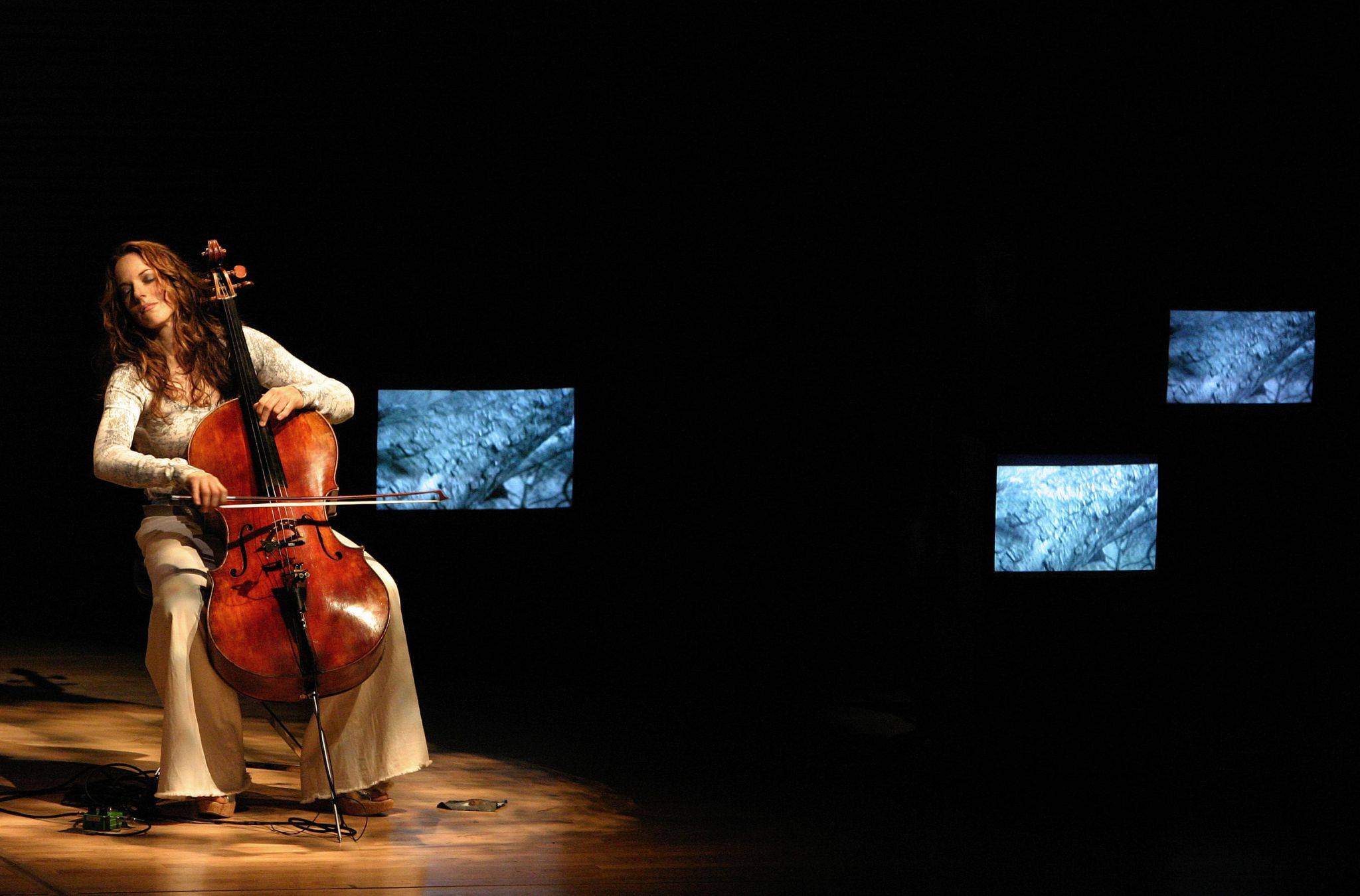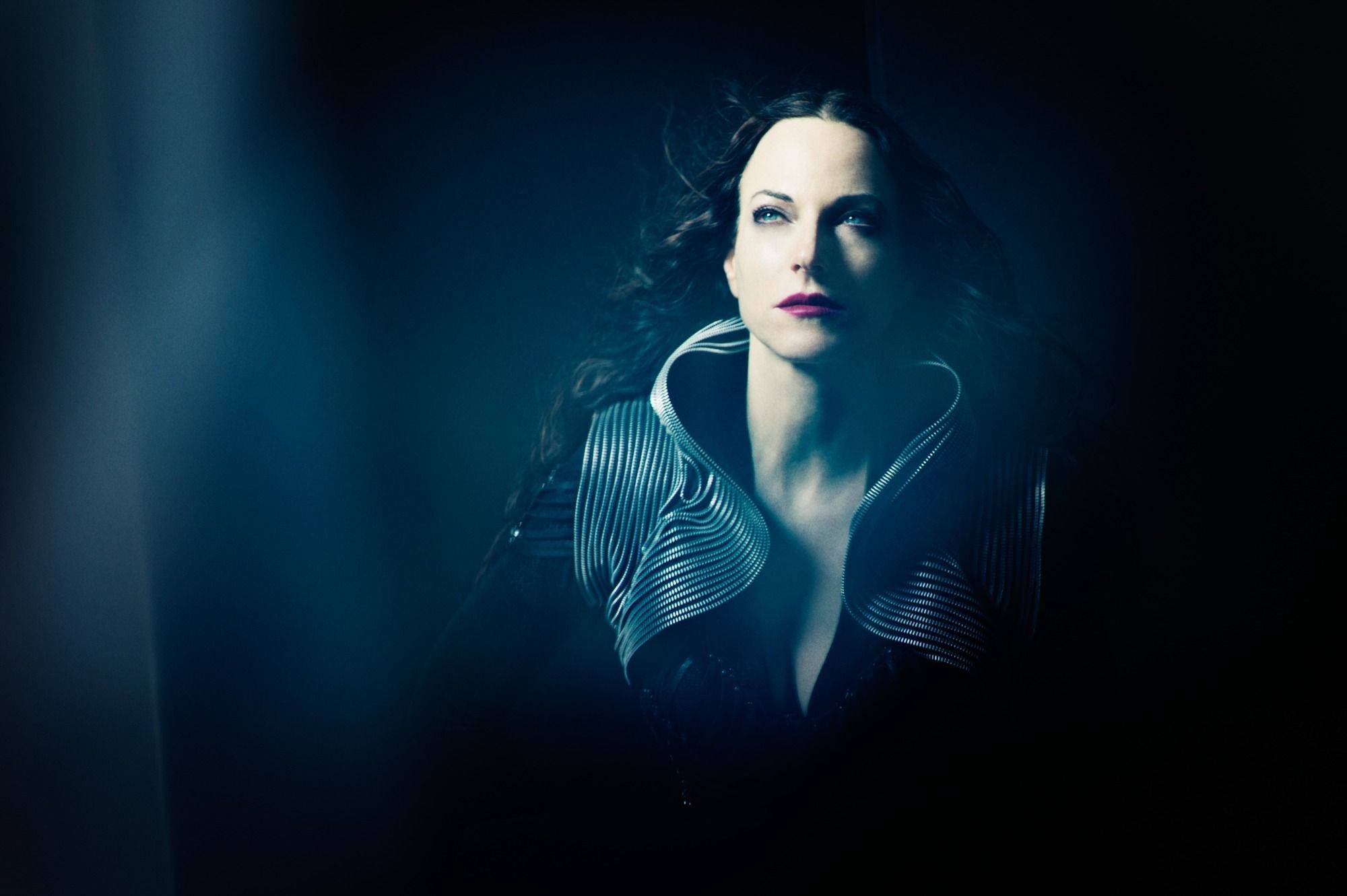Maya Beiser has been dubbed the “cello goddess” by The New Yorker and has, in fact, turned the nickname into her Twitter handle. If you watch her TED Talk performance, it might be completely obvious how she earned that name. You’ll see her playing cello with seven versions of herself. Yeah — that’s right.
Maya’s PR rep provided this perfect description of Maya’s badassary:
Maya is interested in marrying what is usually a very traditional classical music instrument — the cello — with technology. Maya’s recent and upcoming projects have included a concert experience at Stanford Live (Linked Verse, December 7 & 8) with 3D projections (complete with 3D glasses for the audience), a brand new production called All Vows at the Yerba Buena Center in the Bay Area in March, and an album/performance project in which the cello takes over lead guitar and vocals in music by Led Zeppelin, Nirvana, Janis Joplin, and more.
I mean… what!
The Krannert Center for the Performing Arts’ presentation of Labyrinth will be the world premiere of a piece called “Room No. 35” for LED cello. There are adult images in this presentation, so do yourself (and the staff at Krannert) a huge favor and watch the video vault clip at the bottom of the event page (linked above) before you get tickets. And then get tickets.
Smile Politely: How did you get started playing? Did a person or event grab you or was it a gradual sort of thing?
Maya Beiser: I grew up in a Kibbutz in the Galilee part of Israel. It was a self-sustaining commune farm with great idealism about changing the world. Music and art was an essential part of the progressive education. All the kids started to play an instrument when we were six. I wanted to play the cello because I loved the deep human-like quality of its sound. My father had old recordings of Pablo Casals and he would play them for me since the day I was born. It was our special time together. He taught me to love and appreciate art and music. But I was unhappy in the Kibbutz. I was an individualist and a rebel from day one and needed to define my life for myself. The cello became my escape. My “ticket to the world.”
SP: “I wanted to play the cello because I loved the deep human-like quality of its sound.”
That’s an incredibly accurate description. (I played violin for a decade and defended it against cries of people claiming they’re “too screechy!” of an instrument.)
Who are your musical and personal influences? Do they overlap, as one might imagine they do?
Beiser: I can’t separate the people that inspire me into different groups. To me, making music and being a performer, and communicating art in this way is an integral part of who I am as a person. It is all one. My father was the person who influenced me the most in my early childhood. He taught me about the value of art and humanity and about striving to excellence. He was a demanding father and would not settle for mediocracy in his daughters (we are four sisters…). When I was eight, he bought me a tennis racket and said, “It’s either Wimbledon or Carnegie Hall.” This made huge impression on me. I settled for Carnegie Hall.
Another thing my upbringing taught me was the ability to encompass and love many types of music. My childhood musical memories are of early morning practicing the Bach solo cello Suites while the sound of the Muezzin (the muslim call to prayer), from the near by Arabic village, is creeping through the window over looking the Jordan Valley. Later, after school, I would keep on practicing Haydn and Dvorak and hear the Tango music from my parents living room. And there were Janis Joplin, and Leonard Cohen and Pink Floyd and Brian Eno and Laurie Anderson. But also Rauschenberg and Ingmar Bergman and Kafka and Madonna. Quite a varied group, I know. And I think/hope one can get that in my albums and performances. I try to show how all of this is relevant, as long as its great and honest and goes all the way.
SP: Indeed!
[I like the idea, dear readers, that Maya Beiser “settled” for Carnegie…]
Did you feel a lot of pressure because of those high standards set by your father, or did you simply rise to the occasion? (Obviously you did eventually, but was that journey difficult, emotionally, because of the bar being set so high?)
Beiser: I never felt pressure. It was always an internal drive. I think that being an artist (whether performing or otherwise) is something you are born with. It is a gift one is given. And when you have it in you it propels you forward. There are always two layers; the “success” in the outside world, winning competitions and awards, achieving accolades, recognition etc. that is a natural human need for all of us. But ultimately, for me, it was always about making that connection with people, through the music and the performance. It is something no one talks to you about in music conservatory. We learn all these great techniques, but we don’t learn what it means to be an artist. Especially in our intense, global, over-stimulated society. I love the ritual of performance, i love the fact that music allows us to go to places that are far away from the here and now, from the mundane. In a strange way, even though you are in a big concert hall, its a very intimate event.
SP: Where are some of your favorite places you’ve played? Why? The venue, people, language, food…?
Beiser: There are many amazing performances experiences and places that are imprinted in my memory. Here is one that was especially powerful: In the mid-nineties, I was a member of the pioneering electro-acoustic group, Bang On A Can All-Stars. We were on tour in Eastern Europe and arrived for one show in Vilnius, Lithuania. They have just emerged from years of Soviet occupation and it was still a very grim place. Food was scarce, especially fresh fruits and vegetables (I am a vegetarian, and I was practically starving as i had hardly anything to eat). As you can imagine, i was unhappy and couldn’t wait to take the one daily flight back into Western Europe… but then the concert day arrived and by the morning hours, during our soundcheck, people began to line up to buy tickets for the show. It was sold out and there were hundreds of people standing outside for hours in the bitter cold hoping to get a ticket. Some stayed up the night before to beat the line.
It was a remarkable experience for all of us. To realize that you can really have an impact on people’s lives with your music. That they really care and make sacrifice to hear the music. That it is really truly important. The next morning, when we got on the bus to get back to the airport, some of our fans managed to get on the bus with us. They just wanted to extend that experience.
We are taught in our society to revere math, science and technology and of course, money and commerce. Music is considered something you can toss. You can do without. But I learned, especially through my travels around the world how important music is.
It was also wonderful to perform in China. Especially in Beijing and Shanghai, remarkable places and there is such thirst for Western music.
SP: “I love the ritual of performance.”
YES. And my pre-show routine is almost unbreakable. What’s your performance day prep? Are there certain foods you “must” have or things you do to get in stage mode?
Beiser: I don’t like to eat much on performance days. I usually have fruit for breakfast and then a light vegetarian lunch. I can’t eat right before I perform so I always have dinner late after the show and by then I am so hungry.
We usually have soundcheck until the late afternoon (depending on the complexity and technical requirements of each show) and then I like to go back to my hotel, for a short rest, shower etc. It’s kind of this “cleansing” and “resetting”. Clearing my mind. It feels great to get dressed and do my make up. Strangely, It helps to focus me.
SP: I’ve spend my last dollar on live local music a few times. It is essential and so often dismissed.
If you had $50 left, what would you buy; who would you give it to; what would you do with it?
Beiser: If I had $50 i would give it to one of the children that I am sponsoring through Save The Children organization.
Nothing that I can do or buy with that money is more important and valuable. $50 can pay for a whole month of food, healthcare and education for a child in Haiti. I am very privileged. Most of us are. And I try to remember that every day.

SP: A tremendous philosophy and practice. Gratitude is an action, not a feeling.
Is there anything else you would like our readers to know?
Beiser: Just that I hope they would journey into the Krannert Center for the Performing Arts to see/hear the Labyrinth performance. It’s a wonderful collaborative exploration into music, visual art and theater.
Thank you for your questions. I enjoyed it.
SP: The feeling is mutual.
———
I could have talked to Maya for many, many more hours, but, unfortunately, we both had to move on with our lives. Labyrinth will be presented at 7:30 p.m. at The Krannert Center for the Performing Arts on Saturday. Tickets range from $10-25 dollars, so you really have no reason not to see this incredible woman. You will not regret it.
Top photo courtesy of ioulex.








